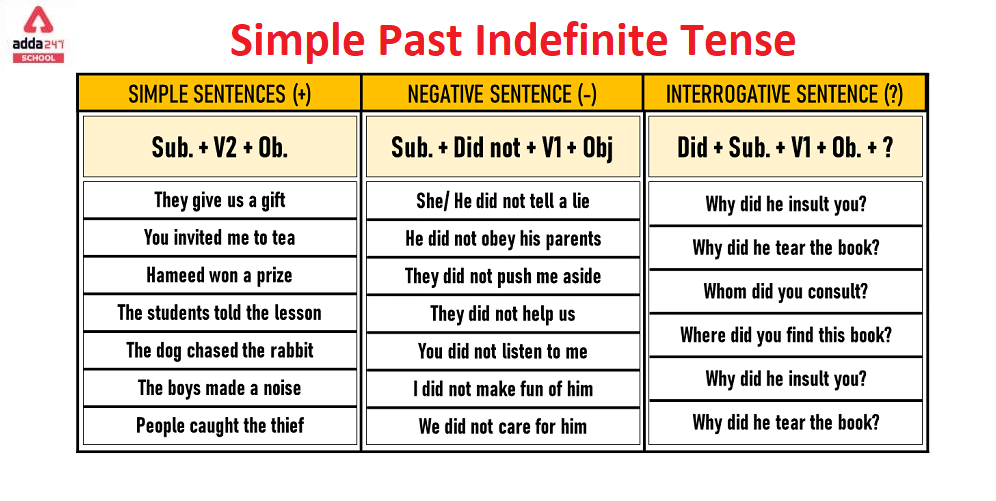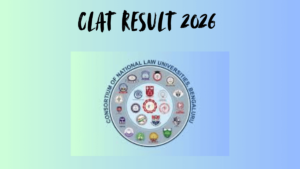The Simple Past Indefinite Tense is also known as the simple past tense. This tense represents past events or conditions that have already happened or been accomplished by a person. Simple Past Tenses are typically formed in English by adding “-ed” to regular verbs. But all past forms are not made with “ed”, the past form is different for Regular and Irregular verbs. Read the complete article to know the Simple Past Indefinite Tense definition, Examples, how the sentences are formed, uses, past form of different words and more.
Simple Past Tense
The simple past tense is a verb tense that describes a previous action or event. It is used to refer to certain previous activities, habits, or states of being that are no longer active. However, irregular verbs have unique past tense forms that do not follow this pattern.
Here are some instances of regular verbs in the simple past tense:
- I walked to the park yesterday.
- She played the piano beautifully.
- They watched a movie last night.
And here are a few examples of irregular verbs in the simple past tense:
- I went to the store earlier today.
- He ate a delicious meal for dinner.
- They slept late on the weekend.
Simple Past Indefinite Tense
The simple past (also called past simple or past indefinite) is a verb form used to indicate repetition, habit, or generalization of an earlier time. Less commonly, you can use the simple past tense to refer to actions or states that happened in the past and are finished and completed. Read on for detailed explanations, examples, and simple present tense exercises.
Simple Past Indefinite Tense- Definition
The “simple past”, according to the Cambridge Dictionary, is defined as “the form of a verb used to describe an action that happened before the present tense and is no longer happening. It is usually made with adding -ed.
Collins dictionary defines “past simple” as “past simple tense used to indicate the past.”
Macmillan dictionary defines past simple as “past simple tense used to indicate actions, habitual behavior or situation that occurred or existed before”.
Simple Past Indefinite Tense- Examples
Here, we will discuss some examples of Simple Past Tense
- She went for a walk early in the morning.
- Mala went to the cafe every week.
- The teacher taught the coaching.
- Did you want to come with us?
- He didn’t go to school regularly.
- Maria never wore nice clothes.
- Didn’t you speak well English?
- My mom didn’t go to the market every day.
- The train arrived on time.
- Crickets didn’t store nuts for the winter.
- Rivers flowed towards the ocean.
- James never brushed her teeth regularly.
- He loved to play cricket every Sunday.
- Ashu and I went to the mall every Sunday.
- My Father didn’t work in America.
- Did other people also come to you?
- My aunty cooked delicious food.
- She usually ate diet food.
- We never went to the hill station.
- Did she go to school by bus?
Simple Past Indefinite Tense- Formula and Structure
Affirmative (Positive), Negative, Interrogative, Negative Interrogative
The general formula of the Simple Past Tense (Indefinite Tense) is given below
| Subject + past form of the verb (verb 2) + rest of the sentence. |
The formation of the Simple Past Tense (Indefinite Tense) can be analyzed with reference to positive, negative, interrogative, and negative interrogative types of sentences. Have a look at the table given below for a better understanding.
| Positive | Negative | Interrogative | Negative Interrogative |
| Subject + past form of the verb (verb 2) + the rest of the sentence |
Subject + did + not + base form of the verb + the rest of the sentence (or) Subject + didn’t + base form of the verb + the rest of the sentence |
Did + subject + base form of the verb + the rest of the sentence? | Did + subject + not + base form of the verb + the rest of the sentence?
(or) Didn’t+ subject + base form of the verb + the rest of the sentence? |
Examples
|
Examples
|
Examples
|
Examples
|
Simple Past Tense- Understand Through Video Explanation
Watch the given video on the simple past tense so that you can understand it better.
Simple Past Indefinite Tense– Rules for Sentences
To use the simple past correctly and effectively, there are some rules and points to remember. This is because in positive and other forms different forms of the main verb will be used.
- Regular Verb Conjugation – To express the main verb of a sentence, simply add “-ed” to the end of regular verbs and “-d” to the end of regular verbs that end in “e”.
For example:- cook- cooked, reach- reached, work- worked
2. Verbs that stay the same – Some verbs have the same spelling as the base verb and remain the same in the past tense.
For example:- cut-cut, put- put, set- set
3. Verbs with different spelling patterns – Irregular verbs follow different spelling patterns, but there are no rules explaining why.
For example:- buy- bought, catch- caught, drink- drank
4. While using did in the sentence use the base form of the verb with did.
Simple Past Indefinite Tense- Uses in Sentences
Some uses are given below for the Simple Past Tense:
- Use the simple past tense to refer to an action or event that happened in the past.
- It doesn’t matter that the action happens when you speak.
- Describe a series of actions that occurred in succession (habitual).
- You can use the simple past tense to speak about something that was true for some time in past.
Simple Past Tense Interrogative negative sentences Examples
| POSITIVE | NEGATIVE | QUESTION |
|---|---|---|
| He met his wife 6 years ago. | He didn’t meet her. | Did he feel sad yesterday? |
| I graduated from the university. | I didn’t graduate. | Did they watch a movie? |
| They watched a movie yesterday. | They didn’t watch a movie. | Did he meet her? |
| You went to the bed early. | You didn’t go to the bed early. | Did she study in the library? |
| She studied in the library. | She didn’t study in the library. | Did the police find any clues? |
| They had dinner last night. | They didn’t have dinner. | Did we make a cake for you? |
| He felt sad yesterday. | The police didn’t find any clues. | Did you go to the bed early? |
| We made a cake for you. | I didn’t become a teacher. | Did they have dinner last night? |
| The police found some clues. | He didn’t feel sad yesterday. | Did I graduate? |
| I became a teacher two years ago. | We didn’t make a cake for you. | Did I become a teacher? |
Simple Present Indefinite Tense- Exercise
Q.1 Fill in the blanks with the correct form of the verb as given in the brackets.
- He ______ to the office every day. (go)
- When ____ you go to school? (does)
- She _______ she is so intelligent. (think)
- Did he _____ in India? (lives)
- I ______ a letter to my father every month. (wrote)
- He _____ to college regularly. (go-negative)
- I_______ left after seeing the crowd. (take)
- My friend…………the bills. (pay-negative)
- Dogs …………………….at family members. (not bark)
- Tom told me that he would meet me before I _____ for Bangalore. (leave)
Answers
- He went to the office every day. (go)
- When did you go to school? (does)
- She thought she is so intelligent. (think)
- Did he live in India? (lives)
- I wrote a letter to my father every month. (wrote)
- He didn’t go to college regularly. (go-negative)
- I took left after seeing the crowd. (take)
- My friend didn’t pay the bills. (pay-negative)
- Dogs didn’t bark at family members. (not bark)
- Tom told me that he would meet me before I left for Bangalore. (leave)
Simple Past Indefinite Tense in Hindi
सरल अतीत (जिसे अतीत सरल या अतीत अनिश्चित भी कहा जाता है) एक क्रिया रूप है जिसका उपयोग पहले के समय की पुनरावृत्ति, आदत या सामान्यीकरण को इंगित करने के लिए किया जाता है। कम सामान्यतः, आप साधारण भूतकाल का उपयोग उन क्रियाओं या अवस्थाओं को संदर्भित करने के लिए कर सकते हैं जो अतीत में हुई थीं और समाप्त और पूर्ण हो चुकी हैं।
विस्तृत स्पष्टीकरण, उदाहरण और सरल वर्तमान काल अभ्यास के लिए पढ़ें।
सरल भूत काल (अनिश्चित काल) – परिभाषा
कैम्ब्रिज डिक्शनरी के अनुसार, “सिंपल पास्ट” को “एक क्रिया के रूप में परिभाषित किया गया है जो वर्तमान काल से पहले हुई क्रिया का वर्णन करने के लिए प्रयोग किया जाता है और अब नहीं हो रहा है। यह आमतौर पर जोड़ने के साथ बनाया जाता है।
कोलिन्स डिक्शनरी “अतीत सरल” को “अतीत को इंगित करने के लिए प्रयुक्त पिछले सरल काल” के रूप में परिभाषित करता है।
मैकमिलन डिक्शनरी पास्ट सिंपल को परिभाषित करता है “पिछले सरल काल का उपयोग क्रियाओं, अभ्यस्त व्यवहार या स्थिति को इंगित करने के लिए किया जाता है जो पहले हुआ या अस्तित्व में था”।
सरल भूत काल (अनिश्चित काल): सूत्र
सकारात्मक (सकारात्मक), नकारात्मक, पूछताछ, नकारात्मक पूछताछ
सरल भूतकाल (अनिश्चित काल) का सामान्य सूत्र नीचे दिया गया है
विषय + क्रिया का पिछला रूप (क्रिया 2) + शेष वाक्य।
सरल भूत काल (अनिश्चित काल) के गठन का विश्लेषण सकारात्मक, नकारात्मक, पूछताछ और नकारात्मक पूछताछ प्रकार के वाक्यों के संदर्भ में किया जा सकता है।
Explore more tenses
Simple Past Tense (Indefinite Tense)-FAQs
Q.1
Ans. The simple past (also called past simple or past indefinite) is a verb form used to indicate repetition, habit, or generalization of an earlier time. Less commonly, you can use the simple past tense to refer to actions or states that happened in the past and are finished and completed. Examples – She took bath daily in summer., We went for a walk in the morning.
Q. 2 Why do we use Simple Past Tense?
Ans. We use the simple past tense to refer to an action or event that happened in the past.
Q.3 Which form of the verb is used in Simple Past Tense?
Ans. In Simple Past Tense, the past form and with did the base form of the verb will be used.
Q.4 What is the other name for Simple Past Tense?
Ans. The other name for Simple Past Tense is Indefinite tense.
Q.5 What are 5 examples of the simple past tense?
Ans. He went to school every morning.
She understood other languages.
It mixed the salt and the water.
He sang the melodious song.
She enjoyed playing the guitar.









 CUET PG 2026 Registration Started at exa...
CUET PG 2026 Registration Started at exa...
 CLAT Result 2026 Release Date, How to Do...
CLAT Result 2026 Release Date, How to Do...
 SLAT Preparation 2026: Last Minute Tips ...
SLAT Preparation 2026: Last Minute Tips ...














